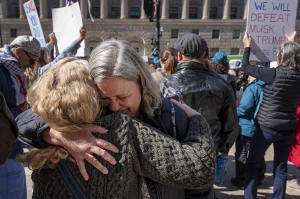Secretary of State Rubio says purge of USAID programs complete, with 83%
of agency's programs gone
[March 11, 2025]
By ELLEN KNICKMEYER
WASHINGTON (AP) — Secretary of State Marco Rubio said Monday the Trump
administration had finished its six-week purge of programs of the
six-decade-old U.S. Agency for International Development, cutting 83% of
them, and said he would move the remaining aid programs under the State
Department.
Hours later, a federal judge said President Donald Trump had overstepped
his authority in shutting down most foreign assistance, saying the
administration could no longer simply sit on the billions of dollars
that Congress had provided for foreign aid. But Judge Amir H. Ali
stopped short of ordering Trump officials to use the money to revive the
thousands of terminated program contracts.
Rubio made his announcement Monday in a post on X, in one of his few
public comments on what has been a historic shift away from U.S. foreign
aid and development, executed by Trump political appointees at State and
Elon Musk's Department of Government Efficiency teams.
Rubio in the post thanked DOGE and “our hardworking staff who worked
very long hours to achieve this overdue and historic reform” in foreign
aid.
Trump on Jan. 20 issued an executive order directing a freeze of foreign
assistance funding and a review of all U.S. aid and development work
abroad. Trump charged that much of foreign assistance was wasteful and
advanced a liberal agenda.
Rubio's social media post Monday said that review was now “officially
ending," with some 5,200 of USAID's 6,200 programs eliminated. Those
programs “spent tens of billions of dollars in ways that did not serve,
(and in some cases even harmed), the core national interests of the
United States,” Rubio wrote.
He said about 1,000 remaining contracts would now be administered by the
State Department.
Democratic lawmakers and others call the shutdown of congressionally
funded programs illegal, saying such a move requires Congress' approval.
In his preliminary injunction Monday, Ali said Trump could not simply
ignore most of what is roughly $60 billion in foreign assistance funding
that was given to USAID and State by Congress, which under the U.S.
Constitution has authority to spend money.
“The constitutional power over whether to spend foreign aid is not the
President’s own — and it is Congress’s own,” Ali wrote.

But Ali declined the request from nonprofit groups and businesses to
revive the canceled contracts for foreign assistance work around the
world, saying it was up to the administration to make decisions on
specific contracts.
Ali also ordered Trump officials to keep paying all of the billions of
dollars it owed to aid groups and businesses up to mid-February, and
ordered them to do it at a pace of at least 300 back payments a day.
Ali's ruling came after the Supreme Court had rejected the Trump
administration's appeal in the case.
USAID supporters said the sweep of the cuts made it difficult to tell
what U.S. efforts abroad the Trump administration actually supports.
“The patterns that are emerging is the administration does not support
democracy programs, they don’t support civil society ... they don’t
support NGO programs,” or health or emergency response, said Andrew
Natsios, the USAID administrator for Republican former President George
W. Bush.
“So what’s left”?” Natsios asked.
[to top of second column]
|

Lane Pollack, center, of Rockville, Md., a senior learning advisor
at USAID for 14 years, is consoled by a co-worker after having 15
minutes to clear out her belongings from the USAID headquarters,
Friday, Feb. 28, 2025, in Washington. (AP Photo/Jacquelyn Martin)

The Trump administration gave almost no details on which aid and
development efforts abroad it spared as it mass-emailed contract
terminations to aid groups and other USAID partners by the thousands
within days earlier this month. The rapid pace, and the steps
skipped in ending contracts, left USAID supporters challenging
whether any actual program-by-program reviews had taken place.
Aid groups say even some life-saving programs that Rubio and others
had promised to spare are in limbo or terminated, such as those
providing emergency nutritional support for starving children and
drinking water for sprawling camps for families uprooted by war in
Sudan.
Republicans broadly have made clear they want foreign assistance
that would promote a far narrower interpretation of U.S. national
interests going forward.
The State Department in one of multiple lawsuits it is battling over
its rapid shutdown of USAID had said earlier this month it was
killing more than 90% of USAID programs. Rubio gave no explanation
for why his number was lower.
The dismantling of USAID that followed Trump's order upended decades
of policy that humanitarian and development aid abroad advanced U.S.
national security by stabilizing regions and economies,
strengthening alliances and building goodwill.
In the weeks after Trump's order, one of his appointees and
transition team members, Pete Marocco, and Musk pulled USAID staff
around the world off the job through forced leaves and firings, shut
down USAID payments overnight and terminated aid and development
contracts by the thousands.
Contractors and staffers running efforts ranging from epidemic
control to famine prevention to job and democracy training stopped
work. Aid groups and other USAID partners laid off tens of thousands
of their workers in the U.S. and abroad.
The shutdown has left many USAID staffers and contractors and their
families still overseas, many of them awaiting back payments and
travel expenses to return home.
The Trump administration on Monday gave USAID staffers abroad until
April 6 to move back to the United States if they want to do so on
the government’s tab, according to a USAID email sent to staffers
and seen by The Associated Press. Staffers say the deadline gives
them scant time to pull children from school, sell homes or break
leases, and, for many, find somewhere to live after years away from
the United States.
In Washington, the sometimes contradictory orders issued by the
three men — Rubio, Musk and Marocco — overseeing the USAID cuts have
left many uncertain who was calling the shots, and fueled talk of
power struggles.
Musk and Rubio on Monday, as Trump had last week, insisted relations
between the two of them were smooth.
“Good working with you,” Musk tweeted in response to Rubio's
announcement.
“Tough, but necessary,” Musk wrote of Rubio's announcement on the
cuts.
___
Associate Press writer Lindsay Whitehurst contributed.
All contents © copyright 2025 Associated Press. All rights reserved |